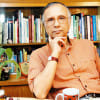Love Letters: A tale of unrequited passion

Love, friendship, and intertwined self-explorations between two diametrically opposite individuals, and the bitter-sweet threads of soulful correspondence stretched over six decades --that's what Dhaka Theatre's play "Love Letters" proposed at Bangladesh Mahila Samity's Neelima Ibrahim Auditorium last Saturday.
The play was translated and adapted by Professor Abdus Selim from American playwright AR Gurney's Pulitzer nominee-play of the same title. Directed by Tropa Majumdar, the production featured thespian couple Ferdousi Majumdar (Maisha Islam) and Ramendu Majumdar (Ananta Shahed Chowdhury) in leading roles.
The initiative of the play was taken by HSBC Bangladesh.
Ferdousi and Ramendu had completely molded themselves into the roles of Maisha and Ananta who begin writing letters to each other as children, with thank-you notes about birthday party invitations, later becoming more intimate as time passes by.

"This play is very close to my heart because I was chosen by and supposed to do this with the late Aly Zaker, one of my closest friends, colleagues, and mentor. We dedicate this play to him," expressed Ferdousi, who enthralled the audiences with her witty, playful, and ingenuous portrayal of the character.
Tropa Majumdar triumphed with her decision to cast two such brilliant actors in this play that orchestrated an entangled cobweb of an intimate, emotional love story with such intricate details and grace of self-introspection and righteousness.
"We are really happy to see such enthusiasm about a simple play like 'Love Letters' among the younger generation despite being devoid of such gimmicks. As for the characters, the two of them are polar opposites of one another, and I wanted to make sure that it was evident," said the director.
Coupled with illustrations by artist Pradip Chakraborty and music by Sourendro and Soumyojit, the set, designed by Palash Hendry Sen, was given a personal touch -- a bookshelf for Ananta, the erudite politician, and painting tools for Maisha, the struggling artist.
"We tried to keep the production as simplistic as possible, without any unnecessary embellishments. My priority was to ensure that the audience could concentrate on the play and the characters rather than a lavish set," mentioned Tropa.
Alongside the actors, set, music and overall presentation, Prof Selim's contextualised adaptation of that narrative was something that stood out. His choice of including Bangladeshi subtexts, and historical connotations made the production relatable to audiences, however, he also made sure that this love story never loses its originality, sweetness, and jovial simplicity.

"We often don't realise the value of something before it's lost to the point of no return. These characters may seem extremely different, but at the end of the day, they gravitate towards each other because they feel a sense of completion with each other, and that was the point I wanted to make through my adaptation," said Prof Selim.
"Love Letters" remains a haunting tale of unrequited love and missed opportunities, melancholy, loneliness, and desolation. In its oblique and unaffected way, the play illustrates the universal truth that so much of life, if not all, is a solitary journey, a letter we write only to ourselves.

 For all latest news, follow The Daily Star's Google News channel.
For all latest news, follow The Daily Star's Google News channel. 









Comments